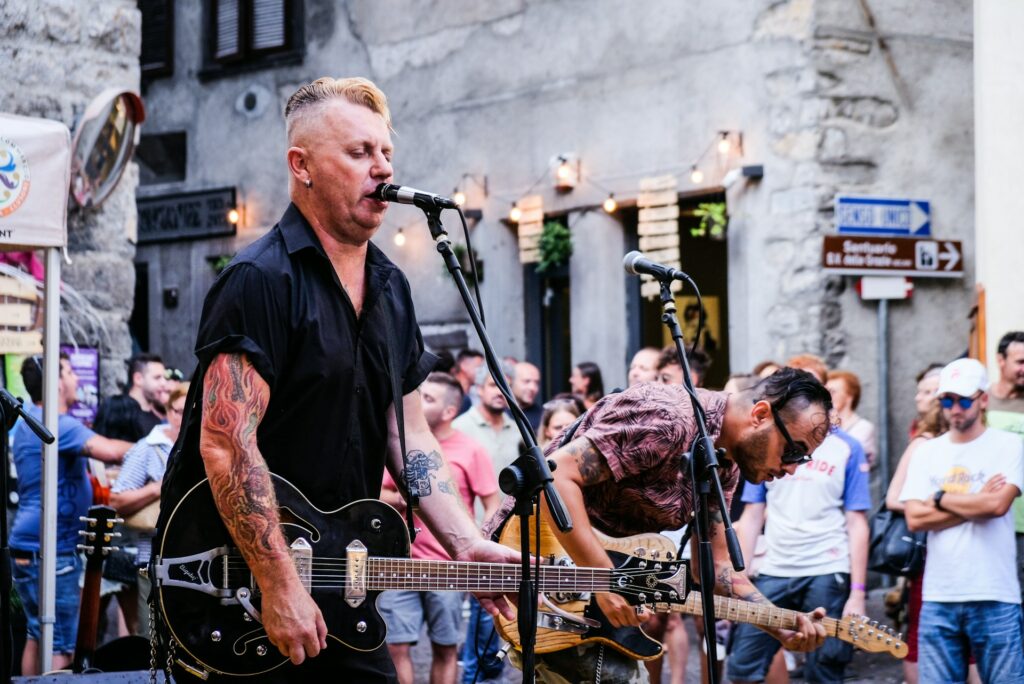Meet the Artificial Intelligence Models That Can Write Music Better Than Pop Stars

Meet the Artificial Intelligence Models That Can Write Music Better Than Pop Stars
For a moment, try to picture a world in which your favorite music was not composed by a single human being. Without a late-night studio session, without an emotional sorrow being translated into words, and without an artist seeking for the ideal tune, there is no music. An artificial intelligence model that does not sleep, does not have writer’s block, and has access to every chord progression, genre, and vocal style known to man is responsible for its creation, which takes place in a matter of seconds.
Those futures are not simply going to arrive. That is already in place.
In the year 2025, artificial intelligence is no longer limited to only assisting artists; it is now capable of writing whole songs, creating memorable hooks, producing lyrics, and even imitating renowned voices. The distinction between human creativity and the intelligence of machines is becoming more hazy, which is causing concerns that are both interesting and, at times, unsettling to be raised. Who actually owns the music if an artificial intelligence is capable of creating a song that sounds better than the most recent hit of a chart-topping artist? To what extent does skill, technology, or something else play a role in the rise to fame of pop stars?
In this article, we will discuss the emergence of artificial intelligence-generated music as well as the innovative approaches that are transforming the way we think about songwriting.
The revolution in artificial intelligence music has already begun.
A multitude of fields, including art and design, computing, and cinematography, have been revolutionized by generative artificial intelligence over the course of the last several years. Music, on the other hand, has always appeared to be the most “human” of the arts. At the end of the day, music is very emotional, highly personal, and often influenced by actual life experiences. This is the reason why a large number of people were dubious when the first music made by AI appeared on the internet.
At first, they were strange; they had robotic voices, lyrics that were clunky, and tunes that lacked any kind of emotions. On the other hand, the rate of advancement was astounding. Music is not the only thing that modern AI models can mimic. The framework of composition is something they are familiar with, they are able to create harmonies, and they can even emulate emotional delivery. You are able to provide them with a concept, such as freedom or sadness, and they will compose lyrics, arrange chords, and construct full songs that reflect that theme.
Artificial intelligence music has been brought into the public via a number of platforms, including Google’s MusicLM, Meta’s AudioCraft, OpenAI’s Jukebox, and other applications supported by startups. The usage of certain of them is common among professional producers. In order to make others sound like certain artists, they are being fine-tuned. Furthermore, the outcomes are so polished and so eerily wonderful that the majority of listeners are unable to identify that they were not created by people.
How Artificial Intelligence Models Actually Compose Music
Massive neural networks that have been trained on millions of audio snippets, lyrics, and songs from every genre are at the core of artificial intelligence’s role in the development of music. Patterns in rhythm, melody, structure, rhyme, and voice are learned via these models for the first time. They have the ability to analyze the emotional tone of music and reproduce it with a precision that is astonishing.
Certain models begin by generating lyrics, and then proceed to match those words with chords and arrangements. Certain individuals operate in the opposite manner, generating melodies that are then paired with voices. A more sophisticated system is able to take a written input, which may be anything as simple as “a summer love song in the style of The Weeknd,” and create a demo of studio-quality music in a matter of seconds.
A number of artificial intelligence voice cloning technologies are also available, which enable producers to enter lyrics and have them performed in the manner of a real or fictitious performer. When combined with generative music backends, this implies that it is now possible for anybody to compose a whole pop song from scratch, without the need to play an instrument or open a digital audio workstation.
What is the end result? Music that is very catchy, algorithmically accurate, and deliberately crafted to sound exactly like the next big smash in the music industry.
More Admirable Than Pop Stars?
In the world of music, this is the question that is causing everyone to turn their heads. People who claim that artificial intelligence is composing “better” music than pop musicians are not implying that the music is more soulful or revolutionary. This means that artificial intelligence is capable of writing songs that are able to match the structure, energy, and auditory refinement of top-charting music, and in certain cases, it can do so more successfully than human authors.
By its very definition, pop music is formulaic. A catchy chorus, emotional buildup, recognizable chord progressions, and lyrics that are wide enough to connect with millions of people are all necessities for a popular song. There is a science to crafting a great song. These formulae have been learnt by AI models without any errors. In some circumstances, they are able to create hundreds of versions on a topic, which enables producers to choose the one that resonates with the audience the most.
Numerous listeners have judged music created by artificial intelligence as being on par with or even superior than tracks composed by humans in blind examinations. Some users of TikTok have gone popular by releasing songs that were created by artificial intelligence and imitate singers such as Drake, Billie Eilish, or Taylor Swift. These songs often confuse fans, who believe that they are an unreleased tune.
Artificial intelligence offers something more to the table, in addition to the personalities, talents, and emotional tales that pop artists bring to the table: boundless and unquestionable originality.
AI is already being used by real artists, but they are doing it in secret.
The workflow of many artists is already being augmented by artificial intelligence (AI) behind the scenes. When they are at a loss for chord progressions, some people utilize it to produce them. Others provide preliminary lyric ideas and seek for comments about the framework of the song. There are a handful that employ artificial intelligence voices to demo songs before recording the final versions.
Instead of being a danger, artificial intelligence is evolving into an unseen partner. Additionally, artificial intelligence levels the playing field for independent musicians who are unable to finance a complete production staff. They are able to compose, create, mix, and master songs on a laptop with the assistance of sophisticated software that is continuously being improved with each passing week.
Even well-known musicians have experimented with it. It has been reported that artificial intelligence has been used to produce components in major releases; nevertheless, the majority of record companies are remaining silent for the time being, potentially in order to prevent backlash or legal difficulty.
The Legal and Ethical Disarray Surrounding Artificial Intelligence Music
All of this, of course, generates a great deal of questions. If an artificial intelligence were to compose a song in the manner of Ariana Grande, who would own the music? Is it considered a violation of copyright if a song that has gone viral is performed by an artificial intelligence clone of a genuine artist? The question is, what happens if someone uses artificial intelligence to make a successful song and then gets renowned for something that they technically did not “create”?
The law regarding copyright is still having trouble catching up. The majority of nations have not provided any clarification about who owns the rights to music that is created by artificial intelligence. There are others who believe that the person who is responsible for providing the AI with instructions ought to be the owner of the AI. Some people believe that the technology business that developed the model could have a case. In addition, the situation becomes considerably more complicated when voice cloning or artist mimicking are involved.
Numerous musicians have already expressed their opinions. Some individuals are seeking protection against the reproduction of their voices without their permission. However, there are some individuals who are enthusiastic about the concept of renting their voice to AI systems as a new source of cash.
We are about to enter unknown ground in terms of both creativity and the law, and the next several years will determine how artificial intelligence and music can coexist.
The Implications of This for the Near Future of Music
Artificial intelligence is not going to eradicate music. Nevertheless, it is going to bring about a significant transformation. There are fewer obstacles to overcome than ever before. You can now produce a hit-level tune in your bedroom using nothing but prompts and software. This is now possible for a youngster living in a small town. That gives one more power. However, this also means that there will be more music than ever before, making it more difficult to stand out from the crowd.
It is possible that in the not-too-distant future, the world of music will be divided into two distinct categories: human-driven creativity and machine-driven excellence. As a response to the polishing effects of AI, listeners could begin to choose songs that have a raw and unpolished feel to them. There is also the possibility that people may gravitate toward songs that combine both elements, combining the soul of a person with the brilliance of a computer.
The use of artificial intelligence in the music business is not going away any time soon. We are already humming along to songs that were composed by robots, regardless of whether or not we are prepared for this.
As if the Machine Were the Soul
Is it possible that artificial intelligence may really compose music that is superior to that of pop stars? Yes, in a great deal of technical terms. It is able to imitate styles, construct lyrics, and even sing with a level of precision that is almost shocking. Real-life experiences are still the source of genuine music, which is music that has the power to affect people, motivate them to make changes, or capture a fleeting moment in time. Heartbreak, pleasure, frustration, and hope are the sources of this emotion.




